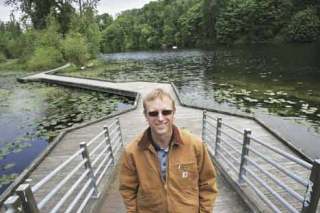The carp are on hold for Lake Fenwick Park.
Kent city officials are still planning to stock Lake Fenwick next May with as many as 300 grass carp in an effort to control Brazilian elodea, a fast-growing, noxious weed that is threatening to overtake the lake.
City officials had hoped to stock the lake earlier this summer, but had to delay the project until 2009 because the city has yet to receive a stocking permit from the Washington Department of Fish and Wildlife. State biologists must review stocking applications before permits are issued.
“It took longer than we anticipated to get the permit issued,” said Matt Knox, a city environmental ecologist, in a phone interview Friday. “We still don’t have it, so it made more sense to wait until spring.”
The stocking permit still needs a couple of more signatures by state officials, but will be ready by next May, Knox said.
“The carp will be able to feed when the elodea starts to grow,” Knox said of what will be fortuitous timing with the spring stocking. “They feed on new growth more ferociously.”
Over the last few years at Lake Fenwick, swimmers have become entangled in the aggressive weed. The weed also forms dense beds that reduce water quality. And the weed, which doesn’t have any native species that eat it or compete with it for lake nutrients, could spread to other lakes if a small piece gets stuck on a boat propellor that later enters a different lake.
The lake is the highlight of the 140-acre park just south of Reith Road at the base of the West Hill. The lake is fairly shallow, reaching 28 feet at its deepest part in the middle.
Brazilian elodea covers about 15 acres of the 23-acre lake. Brazilian elodea used to be a common decorative plant for home aquariums in the 1980s and 1990s. It is now illegal to sell the plant in Washington because of its ability to infest lakes.
A person probably dumped fish from an aquarium into the lake, and that’s how the weed got established, Knox said. He compared the aggressiveness of the weed in the water to how blackberry bushes grow on land.
Grass carp are one of the few fish that eat the weed and actually prefer it over other plants. Other jurisdictions in Western Washington have used the fish to control the weed. The city opted to try carp rather than an herbicide or bottom barrier materials to keep the plants from growing.
The carp, which are sterile, will be about 8 to 12 inches long initially, but can grow as long as 4 feet and weigh as much as 40 pounds.
The city plans to purchase the fish from a farm in Arkansas. Carp can cost anywhere from $5 to $15 each, according to the state Department of Fish and Wildlife. The city has received grant funds from the state to help pay for the project.
City officials installed a fish screen at the outlet channel earlier this summer, to help ensure the resident carp remain in the lake. A 40-foot culvert with angled sides and a few blocking bars were installed to keep the fish in the lake.
It will take a couple of years of carp devouring the weeds for humans to notice the difference. But gradually, the lake, with assistance from its small army of hungry fish, should recover.
“We hope in five years we can get rid of the weed,” Knox said.
When the carp are stocked next spring, city officials want anglers to leave the carp in the lake so the fish can continue to eat the weeds. Anglers now catch bass and rainbow trout at the lake.
Contact Steve Hunter at 253-872-6600, ext. 5052 or shunter@reporternewspapers.com.
Talk to us
Please share your story tips by emailing editor@kentreporter.com.
To share your opinion for publication, submit a letter through our website https://www.kentreporter.com/submit-letter/. Include your name, address and daytime phone number. (We’ll only publish your name and hometown.) Please keep letters to 300 words or less.

